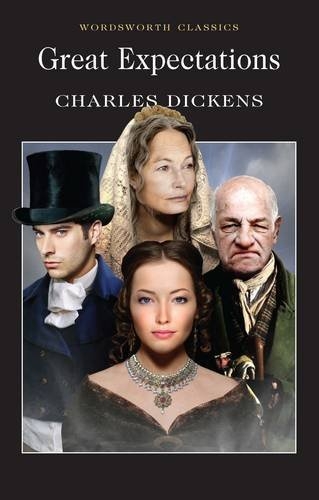Dickens considered Great Expectations one of his "little pieces," and indeed, it is slim compared to such weighty novels as David Copperfield or Nicholas Nickleby. But what this cautionary tale of a young man raised high above his station by a mysterious benefactor lacks in length, it more than makes up for in its remarkable characters and compelling story. The novel begins with young orphaned Philip Pirrip--Pip--running afoul of an escaped convict in a cemetery. This terrifying personage bullies Pip into stealing food and a file for him, threatening that if he tells a soul "your heart and your liver shall be tore out, roasted and ate." The boy does as he's asked, but the convict is captured anyway, and transported to the penal colonies in Australia. Having started his novel in a cemetery, Dickens then ups the stakes and introduces his hero into the decaying household of Miss Havisham, a wealthy, half-mad woman who was jilted on her wedding day many years before and has never recovered. Pip is brought there to play with Miss Havisham's ward, Estella, a little girl who delights in tormenting Pip about his rough hands and future as a blacksmith's apprentice. I had never thought of being ashamed of my hands before; but I began to consider them a very indifferent pair. Her contempt for me was so strong, that it became infectious, and I caught it. It is an infection that Pip never quite recovers from; as he spends more time with Miss Havisham and the tantalizing Estella, he becomes more and more discontented with his guardian, the kindhearted blacksmith, Joe, and his childhood friend Biddy. When, after several years, Pip becomes the heir of an unknown benefactor, he leaps at the chance to leave his home and friends behind to go to London and become a gentleman. But having expectations, as Pip soon learns, is a two-edged sword, and nothing is as he thought it would be. Like that other "little piece," A Tale of Two Cities, Great Expectations is different from the usual Dickensian fare: the story is dark, almost surreal at times, and you'll find few of the author's patented comic characters and no comic set pieces. And yet this is arguably the most compelling of Dickens's novels for, unlike David Copperfield or Martin Chuzzlewit, the reader can never be sure that things will work out for Pip. Even Dickens apparently had his doubts--he wrote two endings for this novel. --Alix Wilber
Authors
Charles Dickens
Additional Info
- Publisher: Wordsworth Editions Ltd
- Format: Paperback
- ISBN: 9781853260049
No copies of this item are currently available.
